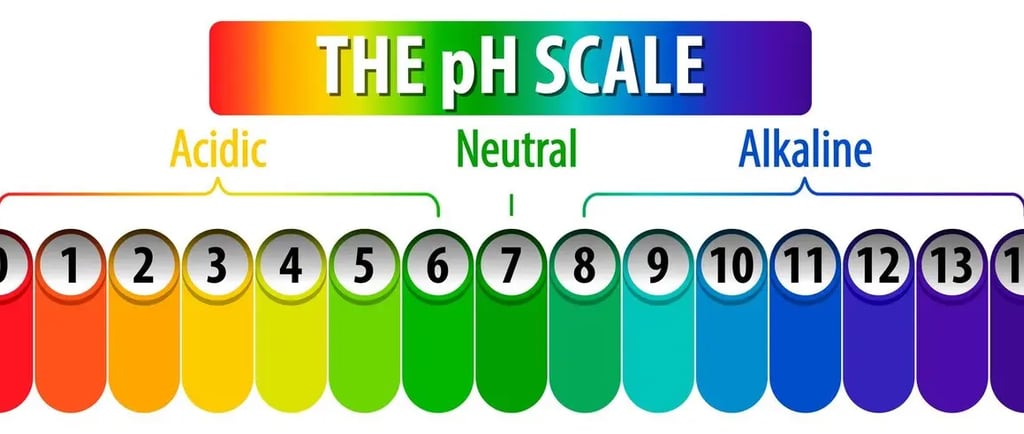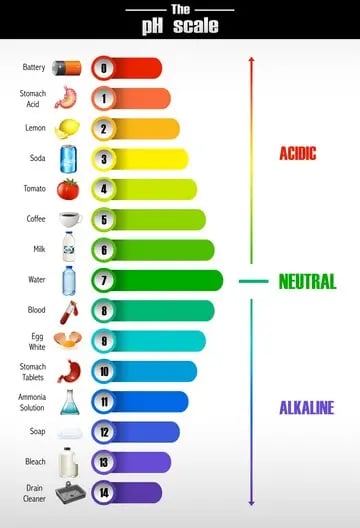Take advantage of discounts on our products!
3 Easy Tests to Check Your Body's pH at Home
Discover simple methods to check your body's pH at home with saliva, urine, and baking soda tests. Maintaining a balanced pH is essential for overall health. Learn how to perform these tests and monitor your well-being effectively.
HEALTH AND WELL-BEING
Holistic Care
11/19/2024


1. Importance of pH Balance in the Body
Maintaining a balanced pH level in the body is crucial for overall health and well-being. Understanding how pH levels impact our bodies and learning how to test and monitor them at home can provide valuable insights into our internal environment. In this article, we will explore the importance of pH balance, discuss the significance of pH levels on health, and introduce three simple tests that you can perform at home to check your body's pH. By gaining a better understanding of your body's pH and making necessary adjustments, you can support optimal health and vitality.
The Role of pH Balance in Overall Health
Maintaining the right pH balance in the body is crucial for optimal health. pH, which stands for "potential of hydrogen," measures how acidic or alkaline a substance is. Our body has different pH levels in various fluids and tissues to support essential functions.
Effects of Imbalanced pH Levels on the Body
When our pH levels are out of whack, it can lead to a range of health issues. An overly acidic environment can contribute to inflammation, weakened immune function, and even diseases like osteoporosis. On the other hand, excessive alkalinity can also disrupt bodily functions and cause problems like muscle twitching or numbness.
2. Understanding pH Levels and Their Impact on Health
What is pH and How is it Measured?
pH is measured on a scale of 0 to 14, with 7 being neutral. Anything below 7 is acidic, while anything above 7 is alkaline. The body regulates pH through various mechanisms, including breathing, kidney function, and mineral levels.
Optimal pH Ranges for Different Body Fluids
Different body fluids have specific pH ranges they should ideally fall within. For example, blood pH is tightly regulated around 7.35 to 7.45, while stomach acid is highly acidic with a pH of around 1.5 to 3.5.
3. Test 1: Using pH Test Strips for Urine Analysis
How to Use pH Test Strips for Urine Testing
To test your urine pH at home, simply dip a pH test strip into a fresh urine sample and compare the color change to the provided chart. It's best to do this test in the morning before eating or drinking anything.
Interpreting Urine pH Results
Ideally, urine pH should fall between 6 and 7.5. A consistently low or high urine pH may indicate an imbalance in your body's acid-base levels, which could be influenced by diet, hydration, or certain health conditions.
4. Test 2: Testing Saliva pH Levels at Home
Procedure for Testing Saliva pH
To test your saliva pH, simply spit into a clean container and dip a pH test strip into the liquid. Wait for the strip to change color, then match it to the provided chart to determine your saliva pH.
Understanding the Significance of Saliva pH
Saliva pH can reflect the overall acidity or alkalinity in your body. An optimal saliva pH is around 6.5 to 7.5, indicating a good balance. Monitoring your saliva pH can give you insights into how your body is responding to factors like stress, diet, or hydration levels.
5. Test 3: DIY pH Test with Baking Soda and Water
Steps to Perform the Baking Soda pH Test
Alright, get ready to whip up some pH magic in your kitchen with this simple DIY test. Here's how you can check your body's pH using just baking soda and water:
a. Mix some baking soda with water to create a solution.
b. Time to get your saliva involved! Spit into a clean container.
c. Pour some of your baking soda solution into the container with your saliva.
d. Watch for any fizzing or bubbling action. That's the science in action, folks!
What the Baking Soda Test Reveals About Your pH
If your mix goes all fizzy like a science experiment volcano, you might have more acidic saliva. No fizz? Your pH might be more neutral or alkaline. It's like a mini chemistry lesson right in your own home!
6. Interpreting Your Results and Making Necessary Adjustments
Comparing Your pH Test Results
So, you've done your pH tests - what's next? Time to compare those results! Whether you've used litmus paper, cabbage juice, or baking soda, take a good look at what your body is telling you.
Simple Ways to Adjust pH Levels Naturally
If your pH is out of whack, fear not! There are easy-peasy ways to nudge it back into balance. From eating more greens to chilling out with some yoga, simple lifestyle tweaks can work wonders for your body's pH harmony.
7. Tips for Maintaining Optimal pH Balance in the Body
Dietary Tips to Support pH Balance
Want to keep your pH levels in tip-top shape? Load up on those veggies, hydrate like a boss, and maybe sprinkle a little lemon water into your routine. Your body will thank you!
Lifestyle Habits for Promoting Healthy pH Levels
Beyond what's on your plate, your lifestyle plays a big role in pH balance. Stress less, move more, and get that beauty sleep - your pH levels will be singing your praises in no time!In conclusion, monitoring and maintaining a healthy pH balance in your body is a simple yet powerful way to support your overall well-being. By regularly testing your pH levels at home and making conscious choices to promote balance, you can take proactive steps towards optimal health. Remember, small adjustments in your diet and lifestyle can have a significant impact on your body's pH, ultimately leading to improved vitality and wellness. Start incorporating these practices into your routine today and feel the difference in your health and energy levels.
FAQ about pH
1. Why is maintaining a balanced pH level important for the body?
Answer: A balanced pH level is essential for proper functioning of bodily systems, enzymes, and cells. It helps maintain overall health and supports optimal body functions.
2. How often should I test my body's pH levels at home?
Answer: Testing your body's pH levels periodically can provide valuable insights. It is recommended to test your pH levels weekly or as needed to monitor changes and make adjustments accordingly.
3. Can diet alone help in maintaining a healthy pH balance?
Answer: While diet plays a significant role in pH balance, lifestyle factors such as stress, hydration, and exercise also impact pH levels. It is important to consider all aspects of your lifestyle for maintaining optimal pH balance.








